How to Prioritize Family Time Without Falling Behind at Work
Most people desperately want to figure out the secret to work-life balance, but the truth is, there’s no one-size-fits-all solution.
The addition of technology to our rushed days adds another complicated layer as well — we’re available around the clock to employers, coworkers and clients, and we constantly feel pressure to be high-performing at the office and in our homes.
Experts talk often about practicing presence, or being more mindful, except it’s hard to do in the face of piles of laundry and a never-ending inbox.
Still, experts say the ability to excel at work while connecting with loved ones at home aren’t mutually exclusive choices.
Here are six ways to make it happen.
Dedicate Screen-Free Time at Home
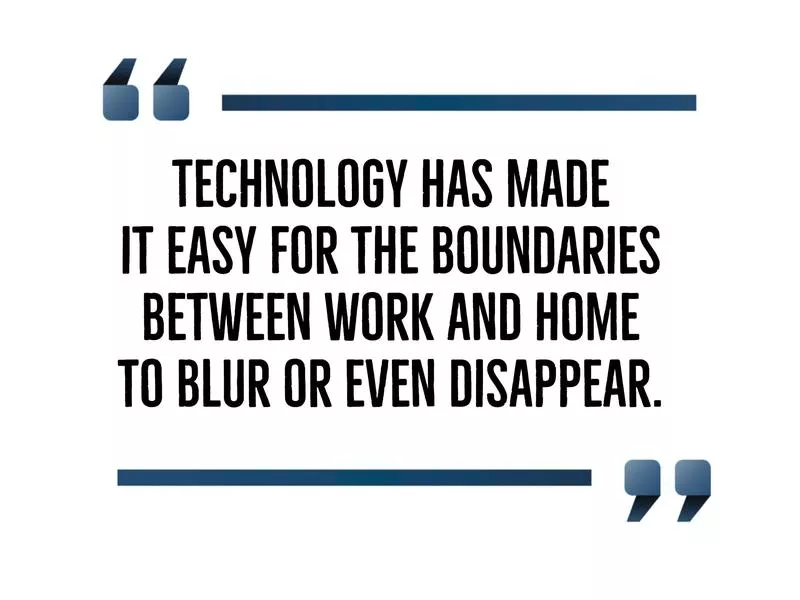
“Technology has made it easy for the boundaries between work and home to blur or even disappear,” said Jaime Malone, a licensed professional counselor and mom of four young children.
“As norms regarding accessibility and speed of response have changed, many professionals feel responsibility to take work home with them in ways previous generations didn’t experience,” she said. “This reality means new strategies are needed to find healthy ways of managing multiple roles and expectations successfully, particularly when they seem at odds with each other.”
One popular approach is to pick specific windows of time to disconnect from technology, such as early in the morning for a little bit before your day begins, or during dinner time with the family, or between certain hours in the evening after you get home from work.
This is easier said than done, of course, because the habit of “checking” our screens is so ingrained.
If you absolutely must answer a phone call or respond to something urgent at work, Malone recommends stepping away to handle it, and then returning only when you can give your family your full attention again. She said it can be confusing to kids when parents are “physically present, but mentally absent.”
Set Up Safeguards
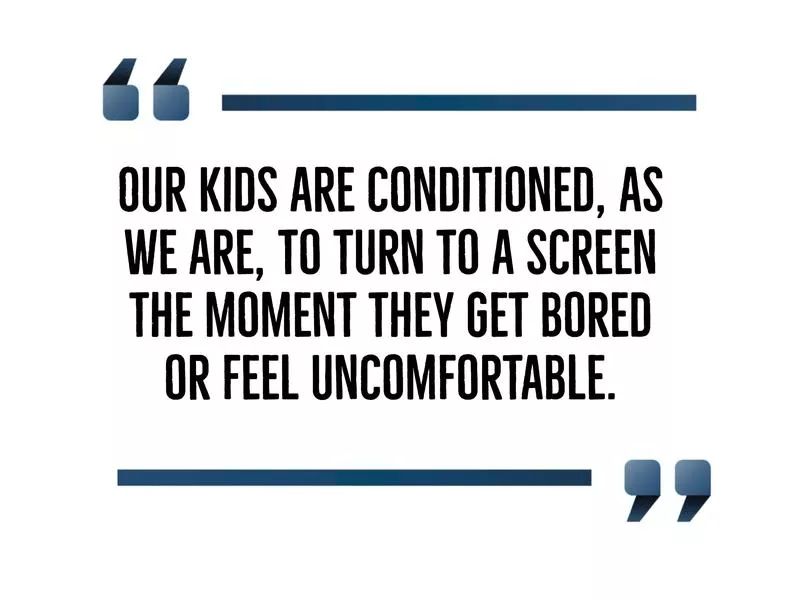
Emily Marquis, a career coach and business owner in Colorado, said she’s actually had to turn off or even hide her phone and computer in order to focus on her two small children — not because she doesn’t want to spend time with them, but because it is so tempting to get sucked in.
Instead, she views family time as sacred, and avoids setting an example of instant responses to any email that rolls in.
“On the evenings and weekends, safeguard family time with no electronics for anyone,” suggested Kendra Davies, owner and coach at Stellar Life Coaching in Orlando, Florida.
“This is hard because our kids are conditioned, as we are, to turn to a screen the moment they get bored or feel uncomfortable,” she said. “It doesn’t have to be for the whole weekend or evening, but set aside tech-free time to speak to each other and have experiences which bring authentic connections and meaning.”
“Being busy is a kind of epidemic in the U.S.,” Davies said. “It is simple to discern if you are using work to avoid something else.”
Test Your Intentions and Feelings
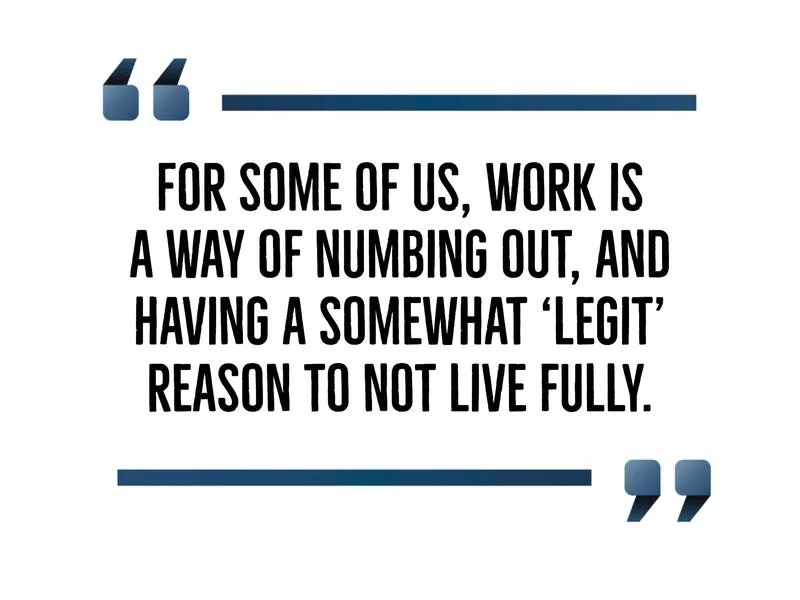
To test yourself, Davies recommended asking yourself the following question and filling in the blanks: “If I put down my phone/laptop, or walk away from my office or desk, I would have to (blank), and I don’t want to do that because (blank).”
In response to that question, Davies said, “Some clients have said, ‘I would have to face the fact that I am alone,’ or ‘I would have to notice how much my kids have grown and I somehow missed it,’ or ‘I would have to deal with my weight issues,’ or ‘I would have to sit with my racing thoughts and feelings of discomfort’ … and ‘I don’t want to do that because it is hard, or I don’t feel like I know how or where to start.’”
“For some of us, work is a way of numbing out, and having a somewhat ‘legit’ reason to not live fully,” she said. “But balance requires a willingness to live as much as a willingness to work.”
Keep Work at Work, Be Home at Home
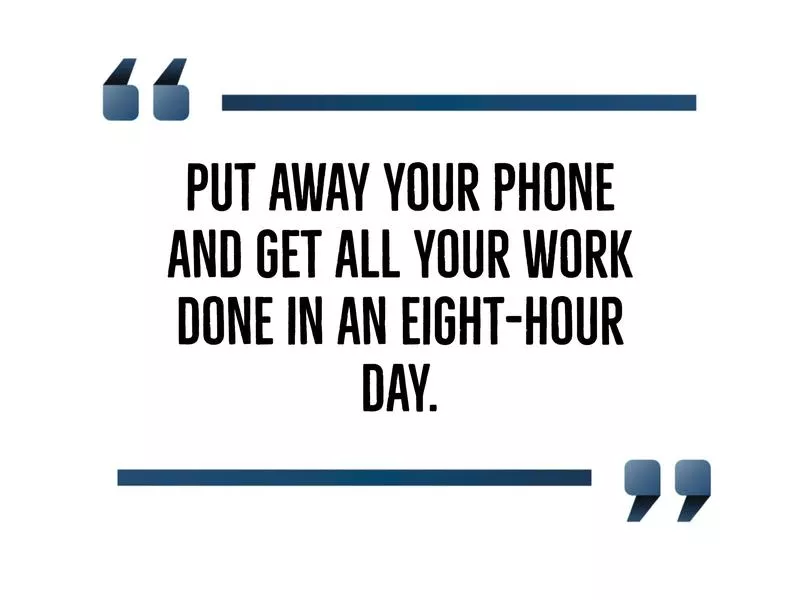
Marriage and family therapist Heidi McBain encourages people to differentiate between work and home, and factor in time to switch between the two.
“If you have a commute, this is often a good time to start transitioning from home to work in the morning and work to home in the evenings,” she said. “Once home, if you can completely disconnect from technology until the next work day, that would be ideal.”
If this isn’t possible, then, she recommends setting times to check your voicemail and return emails. “If you have paperwork you need to finish, it can be helpful to give yourself a certain amount of time,” she said, “and then set a timer and completely focus on the task in front of you.”
Setting Boundaries Protects Your Priorities
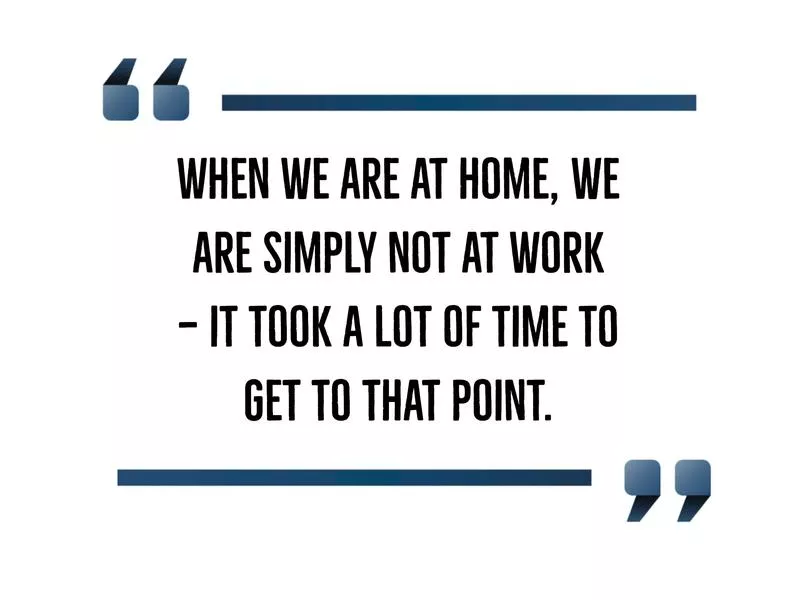
Davies is also a fan of using structured time to focus on family but stay on top of work, like waking up before everyone else and doing emails from 6 to 8 a.m., or diving back into obligations after kids go to bed from 9 to 10:30 p.m. But Cameron Herold, founder of the COO Alliance, said he found the opposite to be true.
“People say they will work at night to ‘catch up.’ The reality is, you can never catch up — you’ll simply set more goals and take on more work,” he said. “Instead, focus during the day, put away your phone and get all your work done in an eight-hour day.”
On the home front, setting boundaries really protects your priorities, says Marquis. “With the constant juggle of owning a business and having a small family, each moment has to be accounted for,” she said. “We even schedule in nothingness.”
“I am not a rigid person, but this has been crucial for my family and I to separate work and life,” Marquis said. “When we are at home, we are simply not at work — it took a lot of time to get to that point. Not being available nights and weekends for our business first seemed limiting, then we saw how it actually limited family time. If we don’t pick up the call for a reservation or make availability for work needs, we have earned more respect and know another one that fits with our schedule will come again.”
Don’t Multitask
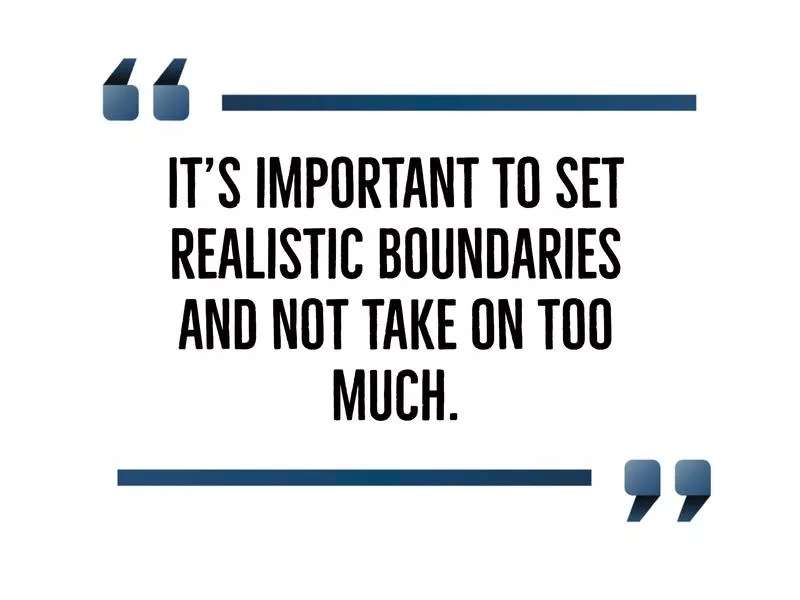
Lots of people assume multitasking is key to juggling work and home life, but this usually backfires and diminishes your ability to pay attention and be present in either environment.
Career consultant and leadership coach Lisa Sansom uses a simple mantra to keep herself in check: wherever you are, be there.
“Be at work when you are at work — participate fully in the meeting, the teleconference, the webinar, whatever,” she said. “If you need a break in the middle of the day to call the school or take care of family matters or run errands, then just do that. But it’s important to set realistic boundaries and not take on too much. Essentially, do one thing at a time, and be in one place at a time.”
Direct Your Attention
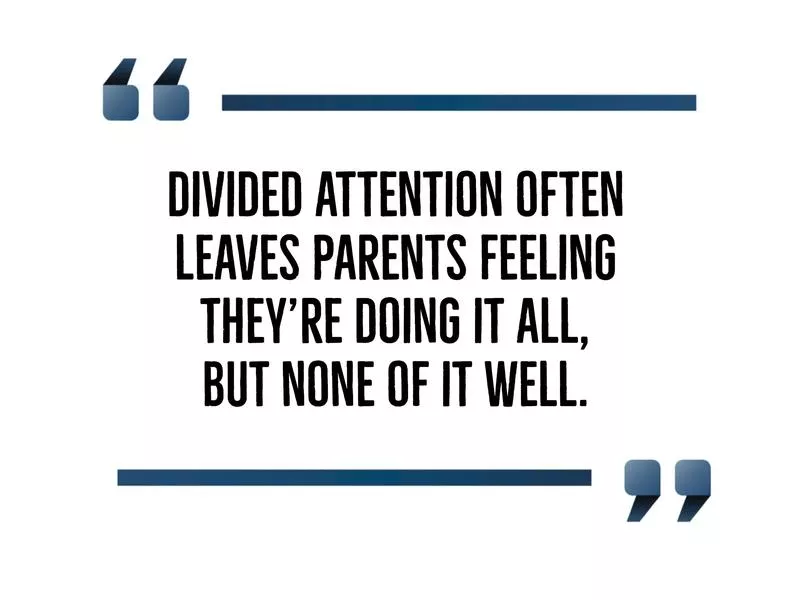
Alexander Lowry, professor of finance at Gordon College and director of the school’s master of science in financial analysis program, relies on single-tasking to be successful. He tries to identify just one thing he can do on a daily basis to be more present — like finishing up a phone call before entering the house, so he can say hello to his loved ones.
“Give whatever you’re focused on your full attention, and then switch gears when you need to in order to give something else your full attention,” Malone said. “If you’re playing with your child and trying to respond to work emails simultaneously, neither is getting the best of you. And you are also depriving yourself of the most meaningful experience full engagement gives you. This type of divided attention often leaves parents feeling they’re doing it all, but none of it well.”
No One Is the ‘Perfect’ Parent or Employee
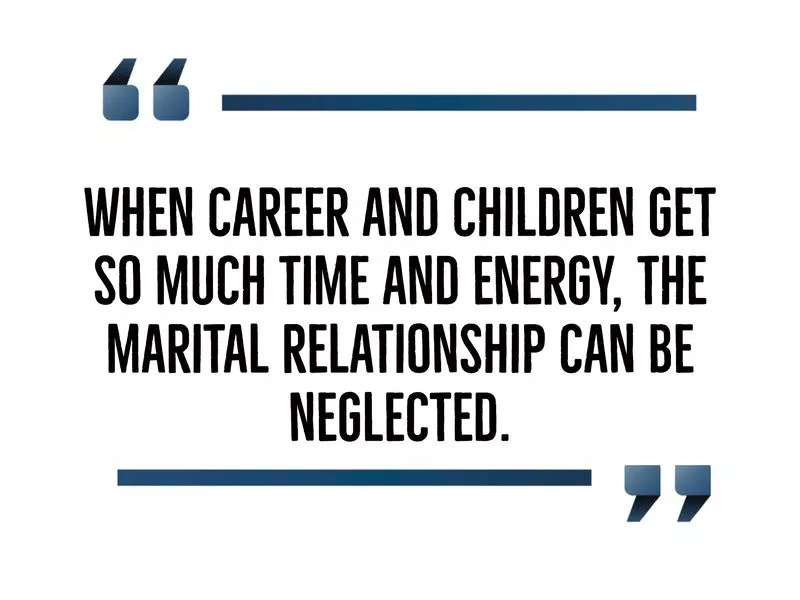
Those of us trying to “do it all” might feel less stressed if we simply cut ourselves more slack, and realized that life is complicated and perfection isn’t real.
For anyone in a marriage of partnership, says Malone, leaning on each other more regularly to cope with the difficult of work-life needs allows both people to thrive, and even find connection.
“Parenthood is a time where a lot of married couples report higher levels of marital distraction,” she said. “This isn’t surprising, as when career and children get much of parent time and energy, the marital relationship can be neglected. Seizing the opportunity to communicate about personal and professional needs, and how you can do this new dance in harmony without stepping on each other’s toes, can be an opportunity for a new level of intimacy.”
Avoid the Guilt Trap
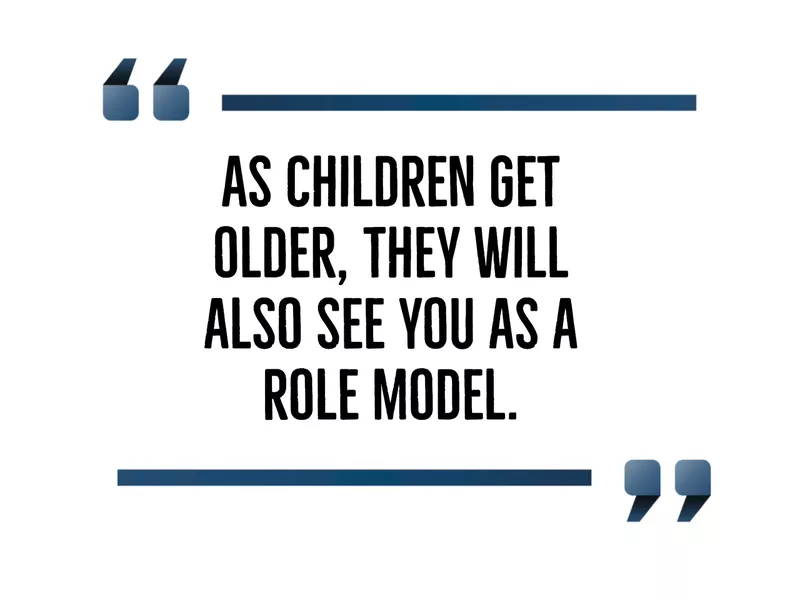
Malone tells parents to avoid guilt trip themselves for not being at the beck and call of their children, either.
“When you take a break from time with your family, you might feel guilt, that you are depriving them of your attention,” she says. “But consider how these periods of time give your children specific opportunities: the opportunity for them to govern their own play, to manage boredom, to find how to occupy and entertain themselves. As children get older, they will also see you as a role model who engages in several valuable activities productively.”
Rather than assume we have to perform and shine in every single arena every single moment of every single day, relying on others for support or delegating extra work to team members can make a huge difference in stress levels.
Weigh Each ‘No’ and ‘Yes’
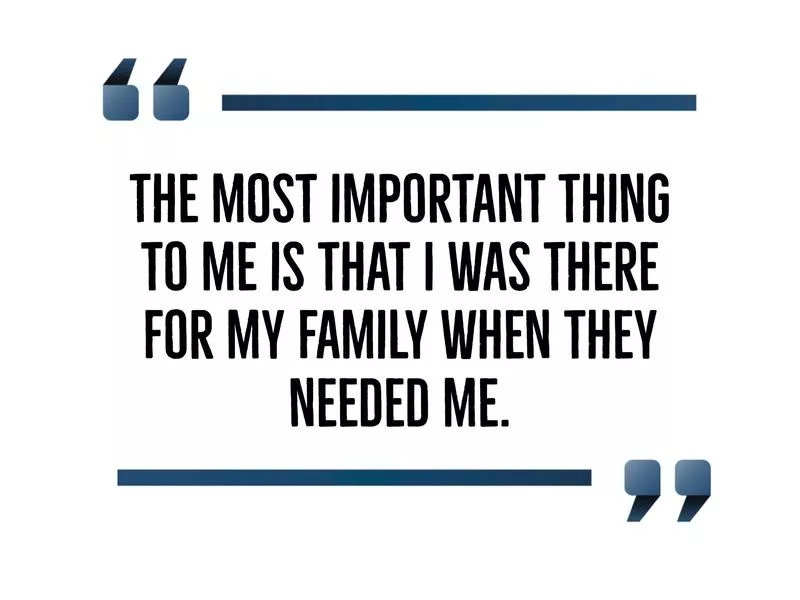
Saying “yes” to one thing means saying “no” to another — and when you tie that directly to your priorities or values in life, this either-or mentality can be useful for decision-making.
For example, saying out loud, “I’m not playing with my son so I can scroll Instagram,” or “I’m not doing chores around the house so I can meet this urgent deadline tonight” makes the related, ideal choice crystal-clear.
“When I look back on my legacy, the most important thing to me is that I was there for my family when they needed me,” says Marquis. “In times of stress and work obligations, I remind myself of that and disconnecting from my work while with my family seems like a no-brainer.”
Be Directed and Devoted
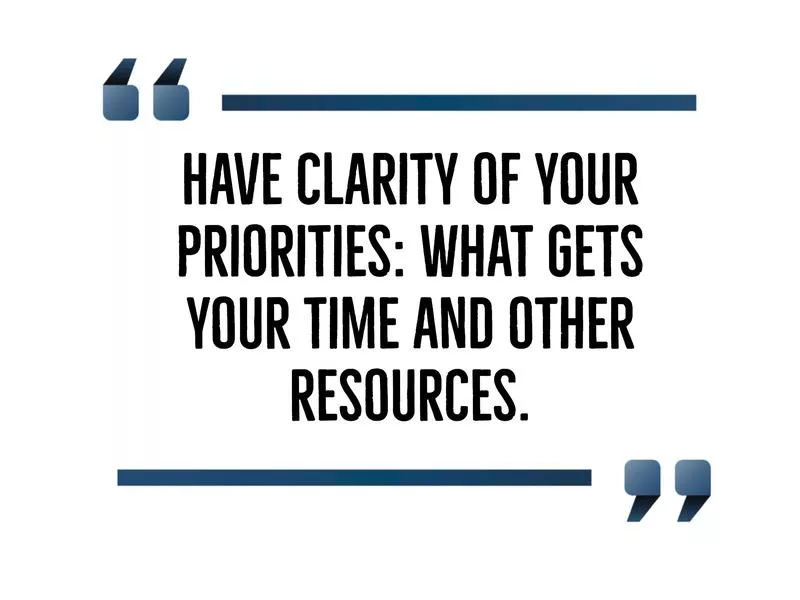
Malone additionally warns against what she calls “rogue” priorities, things that steal your time away but aren’t truly important.
“Have clarity of your priorities: what gets your time and other resources,” she said. “By focusing on what is deserving of your time, parents can discover time that can be devoted to work or family (or both), making the conflict between the two diminish. Priorities shift over time, and when we realize that, it helps in allow some things to fallow.”
Make the Choice

“Life is hard — those are just the terms of living,” Davies said. “We cannot avoid the challenges or the negativity, and we cannot be perfect at everything. We can decide which pain we are willing to endure and choose accordingly.”
Davies said that her her, it’s not worth feeling like she have not been able to connect to her son for a few days because of her busy schedule.
“In those moments where we must choose to put down the phone or to play with our kids, or shower and go to breakfast with our friends, or to spend the weekend working, each of these things has its own consequence,” she said. “Decide now which pain are you more comfortable with. Which are you willing to outright choose?”
Start Small
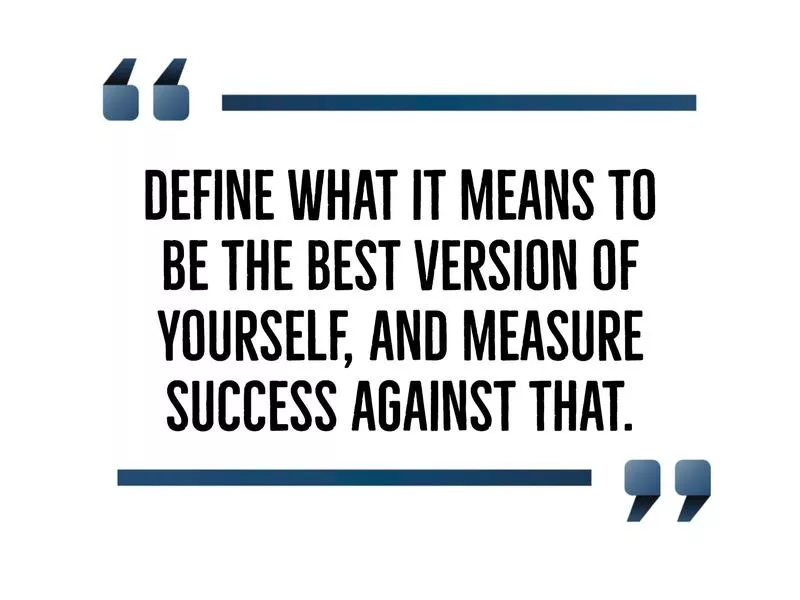
“Remember that change takes time,” says Lowry. “Expecting full disconnection from work the first time you try, and then getting frustrated when you have to take a call during family dinner isn’t helping you toward your goal. Give yourself a break, and make a change that you can commit to. The most important part is that it’s up to you to make it happen.”
Malone tells clients to think about a work-life shuffle, instead of balance.
“Balance implies both parts getting equality: equal time, equal energy,” she said. “And when you think that’s attainable and other people are doing it, you might feel like a failure or have a lot of self-criticism when you don’t feel it’s in balance. A different schema of how to walk in both worlds can help with your self-evaluation.”
“Define what it means to be a good mom, father, son, daughter, etc. to you,” concludes Davies. “A lot of time being out of balance is really about trying to live up to the ideals or values of others, and not knowing what your own values are. Take time to define what it means to be the best version of yourself, and only measure your success against that.”